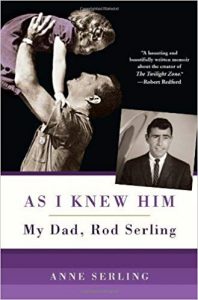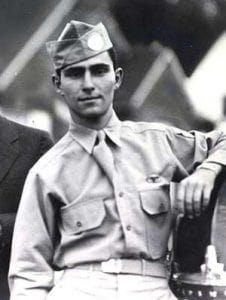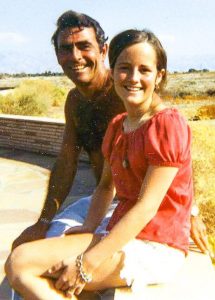Written by his Daughter, Anne Serling
review by VJ Miller, Sr.
 As I Knew Him is not the biography of a man, rather, it is a Daughters vivid memories of a beloved Father. But for a fateful intervention during WWII in the South Pacific: the man would have ceased to exist, the daughter would not exist, this book would not exist, and the Twilight Zone would never have been.
As I Knew Him is not the biography of a man, rather, it is a Daughters vivid memories of a beloved Father. But for a fateful intervention during WWII in the South Pacific: the man would have ceased to exist, the daughter would not exist, this book would not exist, and the Twilight Zone would never have been.
As I Knew Him–My Dad, Rod Serling was published in 2013 but only came to my attention in the past few months. An oversight I regret because it delayed my learning so much.
“You’re traveling through a dimension, a dimension not only of sight and sound but of mind; a journey into a wondrous land whose boundaries are that of imagination. That’s the signpost up ahead—your next stop, The Twilight Zone.”
–Rod Serling
The Voice.
I was 10 years old when the Twilight Zone first aired. Rod Serling was never visible on screen until season two but the voice had a presence , a commanding voice that could scare the hell out of an audience. I was just young enough or smart that I was never scared, rather I was hooked on the series and its premise and could not wait until the next episode.
In the Beginning.
Born of Jewish heritage on December 25th, Rod described himself as a Christmas gift that was delivered unwrapped. Rod is a devoted son and cares deeply about his parents. Family is everything.
When he is about twelve he gets his first job in a local toy store His employer would later write, “Roddy: Nice kid but plays with the toys too much.” In high school he wants to play varsity football but is discouraged by the coach because he found it difficult to reconcile playing a quarterback who weighed less than the team bulldog. Soon he joins the debate team, student council, the drama team, editor of the school paper and member of the honor society. Rod is always a head shorter than the other students. He and friend Julie Golden join the Boy Scouts.
Popular among his contemporaries he was later blackballed by some ULPS members for dating non-Jewish girls. The fight against discrimination and prejudice will remain central throughout his life.
Rod’s Childhood Ends.
The Japanese Armed Forces attack Pearl Harbor. War is declared against the Japanese.

Twenty-four hours later Germany and Italy declare war against the United States. Congress reestablishes the Draft.
Graduating in 1943, rod will soon enlist in the U.S. Army’s 11th Airborne Division. Tapped as the littlest damn paratrooper, Rod’s “guts” got him through basic training and Jump School. Frequent letters keep him in touch with home and family.
In October the 511th Airborne lands on the east side of Leyte in the Philippines. The weather conditions are harsh from slogging through the mud when it rains to sweating in 100 degree heat
A Near Fatal Tragedy.
Rod’s brush with death comes when a Japanese soldier suddenly comes out of the bush, gun pointed directly at Anne’s father who freezes; he can’t move. Salvation comes at the hands of another soldier just before it was too late. Many years later Anne hears her father relate this story to a friend who visited their cottage in upstate New York.
On patrol one afternoon, Rod is wounded by an exploding mortar shell, sending shrapnel into his wrist and knee; receiving the Purple Heart and the Bronze Star for bravery. Rod serves in the Pacific until wars end. Shortly before he is ready to leave he gets news from the American Red Cross that his father has died of a heart attack at 52. His request for emergency leave is refused. The refusal has a devastating effect and is a loss from which he never truly recovers.
Years later he will return to the Philippines in 1965. Walking the same ground after twenty years his memories of those days return with infinite clarity.
After the War.
“I never had a master plan that included a built-in compulsion to write. I really didn’t know what the hell I wanted to do with my life. I went to Antioch because my brother went there. I thought I’d major in physical education because I was interested in working with kids. This was a pretty amorphous thing, not really thought out or planned–but it constituted some vague objective, which, of course, the war put to an end.”
–Rod Serling
1946: Yellow Springs, Ohio. Rod is a freshman. Along with many war vets he carries the emotional scars of battle, for which, at the time, there is no real treatment. Many vets suffer from the aftermath–insomnia, panic, and haunting flashbacks.
Rod feels a kind of compulsion to get some thoughts down and the desperate need for some sort of therapy. He needed to get it out of his gut, to write it down. this is the way it began. Changing his major from PE to language and literature this proves the way back to his once, gregarious nature. Rod writes, directs and acts in a weekly production on a local radio station.
A Chance Meeting at College
While at Antioch, Rod meets, Carolyn Kramer from Columbus, Ohio. After some misgivings by her father and grandparents they are married in 1948. They will spend their honeymoon at the cottage by Cayuga Lake.
Her father did not like Jews and Rod had an absolute antipathy to any form of prejudice. He would write about it throughout his career. In time, Anne’s parents would forgive her grandfather.
Writing whenever he can his first big break comes from Dr. Christian’s radio show. He has won second prize for his script, “To Live a Dream,” about a dying prizefighter who wants to help a young fighter succeed. The prize is $500 and a trip to New York where he will Meet Earl Hamner who will later write for the Twilight zone.
In 1950 Anne’s parents move to Cincinnati where he worked as a staff writer for radio station WLW writing folksy dialog for two hayseed entertainers.
TV Beckons.
Being at the right place at the right time in the early days of television in the 50’s, Rod sells scripts to Kraft Television Theater, Studio One and Lux Video Theater. Many times he would fly from Ohio to New York to participate in story conferences and rehearsals of his shows. Young, and trying to establish himself as a writer, he was the proverbial kid from a small town. Every time he walked into the Network Office he had the, strange, persistent feeling he was wearing overalls and Li’l Abner shoes.
He writes, “his diet consists of black coffee and fingernails.” The persistent regimen of writing and submitting TV plays and subsequent rejections takes it’s toll. it’s obvious the family budget is strained but what it does to a writer’s personality is worse. But his luck will change.
Lux Theater buys 11 of his 12 scripts; there is a glimmer of hope and he is at the turning point of his career. The receptionist doesn’t ask you to repeat your name or ask you how to spell it.
A New Home.
In 1954 they will move with two year old Jodi from Cincinnati to Westport, Connecticut. he completes and sells his script, “Patterns” To Kraft Television Theater. After it airs it is met with rave reviews. In a commentary about writing for television he writes:
“There are two ways for a writer to achieve success. One is the long haul, the establishing of a record of consistent quality in his work. The other way is the so-called overnight success, charged and generated by a single piece of writing that captures the imagination and the fancy of the public and the critics. Patterns was that kind of piece. It came on the air unheralded into the limelight with a fabled kind of entry.”
Rod would receive offers for TV writing assignments, motion picture offers and many requests for interviews. There were lunch offers from Broadway producers and offers to discuss novels with publishers.
Patterns will win him his first Emmy for Best Teleplay Writing. he soon finds he can sell anything.
A New Arrival.
Anne Serling is born in 1955 and in three years, live television is pretty much gone the way

of the dinosaur. Pre-recorded shows became the norm so writers were moving west. In 1958 they moved the family to Pacific Palisades, California.
Life is good and, Rod, the doting father will play Crazy Eights or Go Fish and he will tuck kids into bed. When she is scared she will call out, “Dad? Daddy? Dad?’ and he will talk in a soft voice telling her why she should not fear the dark. Her Dad dutifully checks under the bed for imagined monster which she is sure are hanging there.
Mom is the disciplinarian, seeing that the girls do everything they should. Dad’s anger can be formidable if he had a long day or is stressed but they know it is fleeting.
Hours of Hard Work.
Though he wrote 12 hours a days 7 days a week they never feel his attention is in short supply or he is unavailable. When you are in his presence you are center stage. He is continually entertaining you, either pulling quarters out of your ear, suddenly in the doorway wearing a poncho, playing endless games or walking with Jodi and Anne through the ravine searching for salamanders. To be with him is always exhilarating and has an uncanny talent for impersonation with an endless number of voices, and jokes. Like a different playmate every day with an ability to separate work from family. Playing in the doghouse/playhouse or sitting in tiny chairs and drinking imaginary coffee. Rod is under tremendous pressure with writing and battling network censorship, but never lets it show to her or her sister. He would be called “TV’s Angry Young Man”
Time and again he would be called upon to edit his stories so as not to offend sponsors or bigots in the general public while contemplating his next career move.
Enter the Twilight Zone.
The Twilight Zone is about people, about human beings involved in extraordinary circumstances, in strange problems of their own or fates making.
–Rod Serling
It takes a lot of perseverance to get it off the ground. The first pilot “the Time Element” is bought by CBS and shelved for two years until it is picked up by Bill Granet of Westinghouse Desilu Playhouse. Lucy and Desi wielded significant power in the world of 1950’s television. Despite Ad Agency opposition Desi convinces CBS to air it as part of their 58-59 season. With a second chance he begins writing “Where is Everybody” the story of an astronaut who finds himself alone in a strange, vacant town.
The Twilight Zone makes him famous, from a well-respected TV writer to a celebrity and public personality. Narrators were selected and rejected until Rod suggested he should do it, and so the “Voice” was heard at the beginning and end of each episode.
When the Twilight Zone premiers on Oct 2, 1959, Anne is four years old. and allows she has no idea what her father is doing when not playing with them. Showing them how to blow on a blade of grass to make it whistle, or chasing them around the yard. Anne and her sister often sneak into their fathers office to get the variety of sweets there that their mother wants to limit.
Living East and West.
Life becomes bicoastal traveling back and forth with all their pets between California and upstate New York. Summer vacations, after school is out and before her Dad has to write new scripts for the Twilight Zone they vacation at the cottage by the lake. Her Dad relishes the peace and quiet and the lazy afternoons of summer.
In 1962, CBS drops the Twilight show and Rod takes a teaching job at Antioch before he learns that CBS has picked it up for a fourth season. He relishes the chance to exhale with the opportunity to pick up a little knowledge instead of trying to spew it out. A need to regain perspective and spend time with his wife and family.
They move to Ohio and CBS does renew The Twilight Zone but with an hour long format, because bigger TZ might attract a bigger audience. Rod will still write a number of scripts but steps back from the day-to-day involvement.
Teaching and writing place Rod under extreme pressure and the few months they spend at Yellow Springs are not the respite he intended. Attempts to reenergize and revitalize prove futile.
Summers at the cottage never seem long enough and it is time to return to California. The flights are long and their mother brings little gifts to wile away the time.
The final episode of TZ airs In 1964.
After TZ.
The following years bring accolades and increasingly more writing work. the 60’s are dark years and Rod Serling will continue to rail against intolerance and bigotry and racism. He is outspoken and makes his dissatisfaction known. The assassinations of both Kennedys and Martin Luther King affect him dearly and he does not shy away from his beliefs. Anne has heard her dad describe the Vietnam War as “A tragic, bleeding mess–dishonest, immoral and self-defeating.”
Even with all that is happening he still finds time for humor and some practical jokes. On one occasion her bedroom is being redone while she is at school. Racing home to inspect her new room she spies something odd in the corner. One of the dogs has pooped on her new rug. Jumping back in disgust her dad walks over and picks it up in his hands. Staring in disbelief her dad breaks out into laughter. “I got you!” It is plastic dog poop from the novelty store. For months they take turns hiding it in each others space.
Jodi and Anne are away for weeks at camp during those summers in that decade. Their dad always kept in touch through letters whether they be short, long, often funny, hand written or typed. Years later they will still give Anne some comfort.
Other TV Work.
In 1969 he shifts gears to host a show called “Liar Club” where guests are given esoteric Items to describe but only one knows what it truly is. Rod is never told what it is to evoke an honest reaction at the truth. Although it was just a game show Anne believes he did it just because he has a silly streak.
Night Gallery first airs in 1969 and runs for three seasons. Her Dad writes for the series but soon recognizes he does not have creative control and it is a grave error.
All Good Things….
…must come to their inevitable conclusion.
Anne and her dad were more than just father and daughter; they were best buds–pals–playmates. Jokes and pranks between the two were the norm. Together they were as if a single person being so much alike. Apart they always kept in touch through the mail, addressing each other by pet names.
Once, when Anne was staying with a friend she was not there to assist her dad. Wanting to prepare the garden for a corn crop, Rod was struggling with a clunky rototiller that refused to start. Heat, strain or fatigue may have caused Rod a heart attack and collapse. In a month, Rod would go to his final reward
Family and friends were devastated. Anne’s loss would be with her for years. Her odyssey back to understanding and acceptance would be a slow but steady one.
I never met Rod Serling, all I knew of him was the voice on the television. But Anne’s story was so poignant and thorough I actually felt some remorse by the time the chapter of his passing came.
This is as far as I will go with this saga; I think I have sufficiently set the stage for you to grab a copy of Anne’s book for yourself to see how the journey back to being whole again turns out.
Grab your copy from Amazon

If you’d like to join the fun in the FB Page–The Twilight Zone–click the link.
If you enjoy reading books do you write reviews? Here’s why you should in my Post, Writing Reviews and Why It’s Your Duty.
Other reviews by VJ Miller, Sr
-
On Words: Reassurance for the Emerging Writer by Lesley Worthington
-
Astrophysics for People in a Hurry by Neil de Grasse Tyson
-
Tainted Cure by Ashley Fontainne


